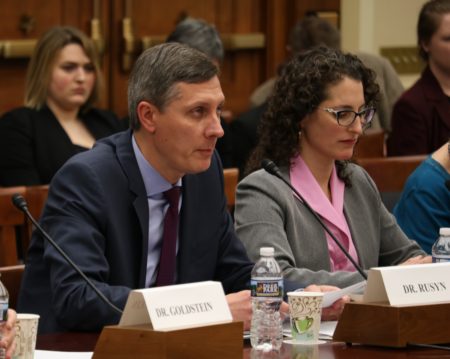Texas A&M Superfund Center Director Testifies in Congress on EPA’s Chemical Assessments

The Investigations and Oversight Subcommittee of the U.S. House of Representatives Committee on Science, Space, and Technology held its first hearing of the 116th Congress on March 27, 2019, to discuss the “EPA’S IRIS Program: Reviewing its Progress And Roadblocks Ahead.”
The hearing was held jointly with the Environment Subcommittee and a panel of six governmental and non-governmental witnesses, including Dr. Ivan Rusyn, professor in the Texas A&M College of Veterinary Medicine & Biomedical Sciences’ (CVM) Department of Veterinary Integrative Biosciences, chair of Interdisciplinary Faculty of Toxicology, and director of Texas A&M Superfund Research Center.
“In this first hearing, we are focusing on a subject that directly impacts the state of public health in this country. The EPA’s Integrated Risk Information System, or IRIS, is tasked with developing impartial, science-based assessments on the toxicity of chemicals. It is considered the ‘gold standard’ for chemical toxicity assessments in the United States,” said Mikie Sherrill (D-NJ), chairwoman of the Subcommittee on Investigations and Oversight.
The impetus for the hearings was the recent Governmental Accountability Office (GAO) Report “Chemical Assessments: Status of EPA’s Efforts to Produce Assessments and Implement the Toxic Substances Control Act” and the Environmental Protection Agency’s (EPA) announcement on the list of priority chemicals that will be evaluated under the Toxic Substance Control Act.
“Everyone here today recognizes the importance of ensuring Americans are protected from the dangers and hazards that IRIS aims to combat. It is for this reason that we must also ensure IRIS’s work is transparent, scientifically sound, and carried out in a timely and efficient manner,” noted Investigations & Oversight Subcommittee ranking member Ralph Norman (R-SC) in his opening remarks.
In his testimony, Rusyn concluded that the IRIS program has implemented the recommendations of the National Academies of Sciences Engineering and Medicine.
“In fact, it is a leader in the evolution of risk assessment practices,” he said. “Therefore, IRIS should be supported with adequate financial resources and staff.”
Rusyn went on to recommend that “while important improvements are being made to the IRIS process, it is important to complete IRIS assessments that are in draft, including formaldehyde assessment, and to increase the number of evaluations that IRIS generates. These changes will need an increase in resources as compared to the current budget. IRIS is vital to public health protection in the United States and abroad.”
###
For more information about the Texas A&M College of Veterinary Medicine & Biomedical Sciences, please visit our website at vetmed.tamu.edu or join us on Facebook, Instagram, and Twitter.
Contact Information: Megan Palsa, Executive Director of Communications, Media & Public Relations, Texas A&M College of Veterinary Medicine & Biomedical Science; mpalsa@cvm.tamu.edu; 979-862-4216; 979-421-3121 (cell)


